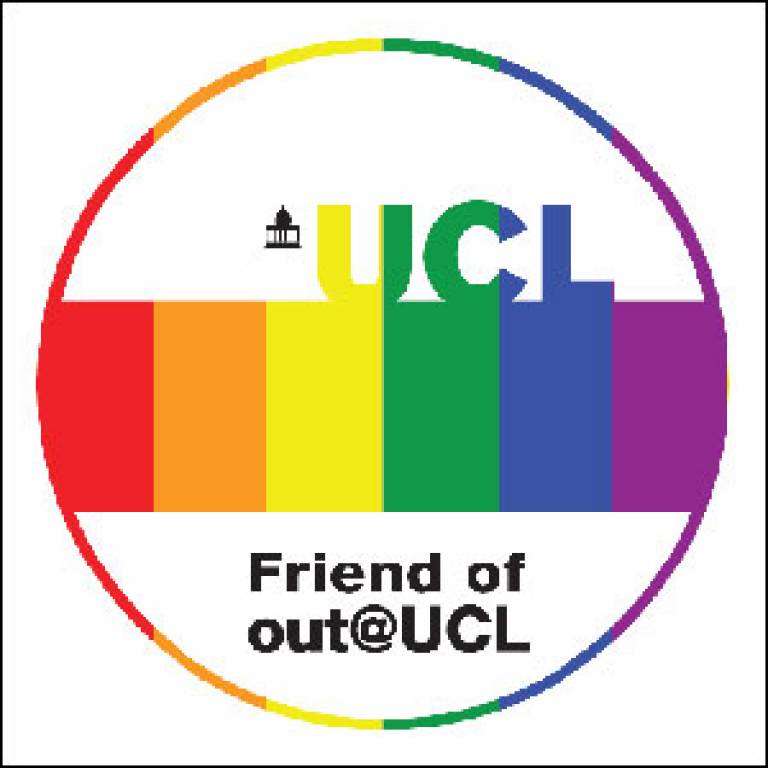Provost's View: LGBT History Month and disability equality
26 January 2017
The rapidly approaching month of February is LGBT History Month, providing an opportunity to review our past, take stock of the present and look to the future on LGBTQ+ equality.

The theme for the month this year is 'Personal, social and health education (PSHE), citizenship and law'. This is apt for many reasons.
As many of you will know, Jeremy Bentham - whose ideas directly inspired the founding of UCL - wrote the earliest known argument for the decriminalisation of homosexuality back in 1785.
At UCL, we remain firmly committed to our liberal roots and are very proud of our pioneering history of inclusivity and equality of opportunity.
It took the law more than 180 years to catch up with Bentham's vision. This July will mark the 50th anniversary of the passing of the Sexual Offences Act 1967. The Act decriminalised homosexuality for consenting males over the age of 21, so although a historic step, it was only a partial reform.
Historic obstacles
Since then, momentum has built slowly until the tide really began to turn for LGBT equality. As the decades passed, the UK saw a lowering of the age of consent, protection from discrimination in employment and service delivery, civil partnerships and, most recently, equal marriage.
Of course, there were obstacles along the way - with the infamous Section 28 (introduced in 1988), which prohibited the 'promotion' of homosexuality in schools, which really setback the LGBT agenda until it was repealed in 2000. The legacy of the criminalisation of homosexuality and Section 28 leave a shadow across UK culture that still exists today.
Our society has made great social progress, but has not brought everyone along with it. Exclusion, non-acceptance and prejudice are still evident. The current resurgence of socially regressive values in some western democracies reminds us that we must never be complacent about hard-won rights.
So what are we doing at UCL today to continue Jeremy Bentham's legacy?
Today, we are a global university working within different cultures and legal systems. The Office of the Vice-Provost (International) is currently developing guidance on supporting students on overseas placements - where their identity may impact upon their experience. This will be beneficial for LGBTQ+ students among others.
We are using the Stonewall Workplace Equality Index as a framework to continue to make good progress on LGBTQ+ equality. From 2016, we have committed to participate in this index every year.
We are delighted to hear that for 2017, we were ranked 113th out of 439 participating organisations, climbing 12 places over two years.
I believe it is certainly within our grasp to achieve a place in the Top 100 LGBT Friendly Employers Index next year. We can do this with continued hard work and commitment.
Equality is everyone's responsibility
We, of course, have an active LGBTQ+ staff network Out@UCL and our UCLU LGBT+ Student Network - both of which do sterling work on the LGBTQ+ equality agenda on behalf of UCL. I encourage staff and students who identify as LGBTQ+ to consider joining the network relevant to them.
However, progressing equality is everyone's responsibility. Allies have always been important to the LGBTQ+ community and I am delighted to announce that we have set up a scheme within UCL to recognise this.
Friends of Out@UCL will be formally launched on 27 February 2017 in the Main Quad Pavilion (5.30-7pm). We have around 50 Friends signed up already, including members of senior management.
We call upon our Friends network to visibly show their support by displaying stickers carrying the Friends of Out@UCL logo. Friends are offered training to ensure that they have the skills to carry out their role.
I call upon UCL staff and students to demonstrate their citizenship this LGBT History Month and join a network or become a Friend. Sign up for ally training and display your sticker with pride!
Disability equality
Alongside UCL's continuing efforts to promote LGBTQ+ equality, we intend to celebrate our achievements in the area of disability equality as well as examine how the university can take measures to challenge barriers to disabled people at UCL.
The vehicle that we have chosen to ensure that we have a coherent approach to doing these things is the Disability Standard operated by the Business Disability Forum (BDF), which UCL has recently joined.
The Disability Standard has 10 criteria against which the university's performance will be measured. These include access to our buildings and facilities, our information and communication technology systems, our approach to making 'reasonable adjustments' under the Equality Act 2010, our procurement processes and the accessibility of our services - in particular our learning and teaching.
To manage this process, Rex Knight, Vice-Provost (Operations) has recruited a self-assessment team (SAT) led by 10 key managers, who will each be responsible for one area of the standard.
They are supported by 20 disabled 'experts through experience' and allies. The SAT will conduct a thorough assessment of UCL's current activity, identifying what we are doing well and developing action plans to improve the university's approach in areas where barriers to the equal treatment of disabled people persist.
Following this internal appraisal of our activity, UCL plans to seek formal evaluation under the standard by BDF. If you would like to find out more about UCL's activity to attain the Disability Standard, please email equalities@ucl.ac.uk.
Professor Michael Arthur
President & Provost
 Close
Close

